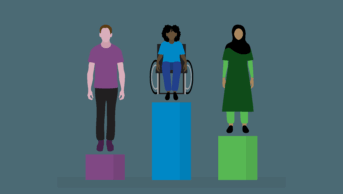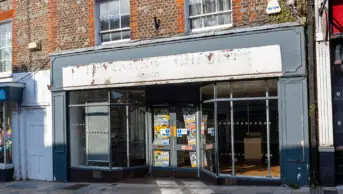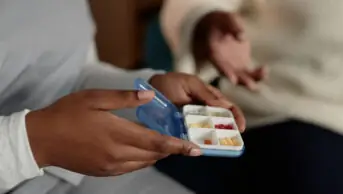
Wes Mountain/Shutterstock.com
By the government’s own admission in its ‘Levelling up’ white paper, published in February 2022, the COVID-19 pandemic has worsened health inequalities in the UK, making them increasingly stark, “with hospital admission and mortality rates higher among more deprived groups”[1].
NHS data paint a despairing picture, revealing higher rates of cancer in the most deprived areas of England, with lung cancer particularly more prevalent in deprived communities[2,3]. Data also show that patients living in the 10% most deprived parts of England, including Blackpool, Lancashire, are also nearly twice as likely to die as a result of cardiovascular disease than those living in the 10% most affluent areas, such as parts of London[4].
The reasons behind these disparities are multifactorial and complex. Health inequalities are not caused by one single issue, but a complex mix of environmental and societal factors that play out in a local area[5].
For its part, the NHS in England has started working towards health equity by launching the ‘Core20PLUS5’ initiative in 2021, which is aimed to improve health inequalities for people living in the 20% most deprived areas[6]. NHS England’s priorities and operational planning guidance for 2023/2024 also highlight the need to continue to narrow health inequalities in access, outcomes and experience, setting targets to increase the percentage of patients being treated for hypertension to 77% by March 2024 and increasing the percentage of patients with a cardiovascular disease risk score of higher than 20% on lipid-lowering therapies[7].
Role of community pharmacy
Community pharmacies have a significant role to play in hitting these targets. For many years, research has shown that pharmacists are well placed to tackle health inequalities. In 2014, research published by a team at the University of Durham showed that people living in deprived areas had greater access to pharmacy services compared with those living in more affluent parts of the country[8]. This makes pharmacy services, such as the NHS community pharmacy blood pressure check service and the early cancer detection service, even more important.
But having practised as pharmacists in several different areas, from inner cities to rural counties, one of the most significant barriers we have found to accessing services in deprived areas is simply a lack of knowledge of the services on offer[9,10].
It is now imperative that students are empowered to understand the role they can play in addressing health inequalities in their future careers
With the government’s £16m fund to boost community pharmacists’ clinical skills, including expanding clinical examination skills training, pharmacists are developing their clinical skills and knowledge further than ever[11]. However, is there any consideration made to whether or not the general public is widely aware of the pharmacy-led services on offer? Can everyone access these services, and if not, what is stopping them? Community pharmacists are doing everything they can to deliver the best care to our communities and release the mounting pressures on the NHS, but should they not also ensure that these services are accessible to every member of the public, especially those in deprived areas?
Addressing these barriers starts with raising awareness of them among pharmacy students. A position paper from the Royal Pharmaceutical Society (RPS) on ‘Tackling health inequalities’, published in January 2023, recommended that education about health inequalities should be included at both undergraduate and postgraduate stages[12]. The General Pharmaceutical Council’s (GPhC) reforms to the initial education and training of pharmacists have also highlighted the need for a greater emphasis on equality, diversity and inclusion in pharmacy education to combat discrimination and address health inequalities[13].
Practical learning
At the University of Nottingham, we believe it is only through practice-based experiential learning that students can understand the real-life environment in which pharmacists practice. These experiences create adaptable pharmacists who are both confident and capable, dedicated to person-centred care, show compassion and empathy, and are proficient prescribers.
When we think back on our training and early career in pharmacy, it is with regret that the topic of health inequalities was hardly discussed. It is now imperative that students are empowered to understand the role they can play in addressing health inequalities in their future careers.
To meet the new GPhC learning outcomes and become confident and competent as integral members of the multidisciplinary team, the Department of Health and Social Care introduced funding for cross-sector clinical placements as part of the MPharm degree from September 2022[14].
To address this, the University of Nottingham School of Pharmacy developed a novel pilot placement, enabling second-year MPharm students to take part in a hypertension case finding service in community pharmacies across the East Midlands. This project aimed to raise awareness about health inequalities to our students, upskill them with clinical, research and interpersonal skills, all while giving back to the placement providers, the NHS and local communities.
The two-day placement was trialled in spring 2022, involving 35 second-year students placed in one of 16 community pharmacies with differing demographics across the East Midlands. Students carried out blood pressure and body mass index measurements on patients as part of a health check service and explained their results to the patients, providing lifestyle advice or an appropriate referral. Following this, students collected data from patients via a questionnaire focusing on the patient’s awareness, accessibility and use of pharmacy services, such as the hypertension service. We decided to focus on this service in line with the East Midlands Academic Health Service Network (EMAHSN) and its work on cardiovascular-related projects with the local integrated care system[15,16].
After their placement ended, students analysed their data to complete the NHS health equity assessment tool. This is a tool for healthcare professionals to systematically address health inequalities. It facilitates the reporting of health inequalities, identifies actions that can be taken to reduce health inequalities and promotes equality and inclusion related to a specific service or programme of work[17]. Through this, the students identified potential health inequalities and proposed recommendations on how to reduce these. These were then shared with the pharmacy team where they had completed their placement.
One month later, the students implemented some of these recommendations. One was to increase awareness of pharmacy services among members of the public, with students conducting public health awareness campaigns at a local library and leisure centre in Newark, Nottinghamshire. The students created resources, such as posters and leaflets, advertising pharmacy services and public health advice in different languages. These resources were shared with pharmacies, local schools and charities, including Age UK.
The students found the placement interesting and rewarding, highlighting that their communication skills and confidence in approaching patients progressed significantly.
The initiative offered students the opportunity to engage with local communities and receive hands-on experience with providing a service, including entrusting them with certain responsibilities — known as ‘entrustable professional activities’ (EPAs).
Entrustable professional activities
EPAs are units of professional practice that can be described as responsibilities or discrete tasks that supervisors entrust trainees with once they have reached adequate competencies. In this case, we developed an EPA for taking an automated blood pressure measurement and body mass index.
By exposing pharmacy students to real-life situations and the differing patient circumstances, they gained both clinical knowledge and an understanding of different patient perspectives in accessing pharmacy services, such as from those patients who had been unaware of the services available beforehand.
While we cannot share any findings from the health equity assessment tool, because we did not gain ethics or consent for patient data to be published, this placement programme is now being collectively evaluated with placement providers and students. It is important to ascertain the benefits for the students. This evaluation will shape how we fully implement this placement going forward. It will also provide valuable learning that will enable schools of pharmacy to implement these types of placements into their curriculum.
Through their placement, students gained an appreciation for the complexities of healthcare inequalities alongside the positive impact they can have as future pharmacists. We hope this experience stays with them through their future career so that when they are delivering patient care, they are able to play their part in providing care for all.
Priyanka Chandarana, assistant professor in pharmacy practice, School of Pharmacy, University of Nottingham; and Rachel Kenward, honorary associate professor, School of Pharmacy, University of Nottingham

Health inequalities
The Royal Pharmaceutical Society’s policy on health inequalities was drawn up in January 2023 following a presentation by Michael Marmot, director of the Institute for Health Equity, at the RPS annual conference in November 2022. The presentation highlighted the stark health inequalities across Britain.
While community pharmacies are most frequently located in areas of high deprivation, people living in these areas do not access the full range of services that are available. To mitigate this, the policy calls on pharmacies to not only think about the services it provides but also how it provides them by considering three actions:
- Deepening understanding of health inequalities
- This means developing an insight into the demographics of the population served by pharmacies using population health statistics and by engaging with patients directly through local community or faith groups.
- Understanding and improving pharmacy culture
- This calls on the whole pharmacy team to create a welcoming culture for all patients, empowering them to take an active role in their own care, and improving communication skills within the team and with patients.
- Improving structural barriers
- This calls for improving accessibility of patient information resources and incorporating health inequalities into pharmacy training and education to tackle wider barriers to care.
- 1Levelling up the UK. Department for Levelling Up, Housing and Communities. 2022.https://assets.publishing.service.gov.uk/government/uploads/system/uploads/attachment_data/file/1052706/Levelling_Up_WP_HRES.pdf (accessed Aug 2023).
- 2There are higher rates of cancer in the most deprived areas. NHS Digital. 2021.https://digital.nhs.uk/data-and-information/publications/statistical/cancer-registration-statistics/england-2019/there-are-higher-rates-of-cancer-in-the-most-deprived-areas (accessed Aug 2023).
- 3How does deprivation vary by leading cause of death? Office for National Statistics . 2017.https://www.ons.gov.uk/peoplepopulationandcommunity/birthsdeathsandmarriages/deaths/articles/howdoesdeprivationvarybyleadingcauseofdeath/2017-11-01 (accessed Aug 2023).
- 4Cardiovascular disease . NHS England. 2019.https://www.england.nhs.uk/ourwork/clinical-policy/cvd/ (accessed Aug 2023).
- 5NICE and health inequalities . National Institute for Health and Care Excellence. 2022.https://www.nice.org.uk/about/what-we-do/nice-and-health-inequalities (accessed Aug 2023).
- 6Core20PLUS5. NHS England. 2021.https://www.england.nhs.uk/about/equality/equality-hub/national-healthcare-inequalities-improvement-programme/core20plus5 (accessed Aug 2023).
- 72023/24 priorities and operational planning guidance . NHS England. 2023.https://www.england.nhs.uk/wp-content/uploads/2022/12/PRN00021-23-24-priorities-and-operational-planning-guidance-v1.1.pdf (accessed Aug 2023).
- 8Todd A, Copeland A, Husband A, et al. The positive pharmacy care law: an area-level analysis of the relationship between community pharmacy distribution, urbanity and social deprivation in England. BMJ Open. 2014;4:e005764–e005764. doi:10.1136/bmjopen-2014-005764
- 9Pharmacy services: delivering quality. Centre for Pharmacy Postgraduate Education. 2023.https://www.cppe.ac.uk/programmes/l/services-e-01/ (accessed Aug 2023).
- 10Health inequalities. Centre for Pharmacy Postgraduate Education. 2023.https://www.cppe.ac.uk/programmes/l/health-e-01 (accessed Aug 2023).
- 11Community pharmacists to get independent prescriber training through £16m fund. Pharmaceutical Journal. 2021. doi:10.1211/pj.2021.1.114685
- 12Tackling health inequalities: Delivering accessible pharmaceutical care for everyone . Royal Pharmaceutical Society. 2023.https://www.rpharms.com/Portals/0/RPS%20Tackling%20Health%20Inequalities.pdf (accessed Aug 2023).
- 13FAQ: reforms to the initial education and training of pharmacists . General Pharmaceutical Council. https://www.pharmacyregulation.org/education/standards-pharmacy-education/faq-reforms-initial-education-and-training-pharmacists (accessed Aug 2023).
- 14Undergraduate Clinical Placements. Health Education England. 2021.https://www.hee.nhs.uk/our-work/pharmacy/transforming-pharmacy-education-training/initial-education-training-pharmacists-reform-programme/undergraduate-clinical-placements (accessed Aug 2023).
- 15Jenkins C. Innovation for Healthcare Inequalities Programme . EMAHSN. https://emahsn.org.uk/our-work/innovations/innovation-for-healthcare-inequalities-programme-inhip/1464-innovation-for-healthcare-inequalities-programme-inhip (accessed Aug 2023).
- 16Jackman T. Innovation for Healthcare Inequalities Programme . EMAHSN. https://emahsn.org.uk/news-blog/blog/1496-innovation-for-healthcare-inequalities-programme-inhip-why-it-s-needed (accessed Aug 2023).
- 17Health Equity Assessment Tool (HEAT): executive summary . Public Health England. 2021.https://www.gov.uk/government/publications/health-equity-assessment-tool-heat/health-equity-assessment-tool-heat-executive-summary (accessed Aug 2023).


